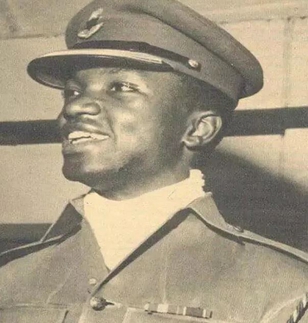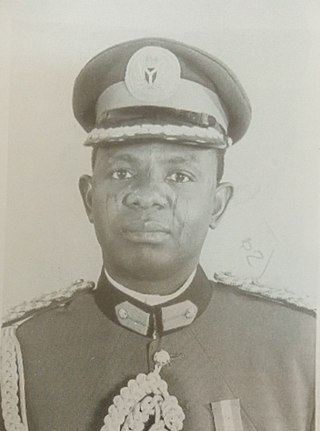Related Research Articles
Johnson Thomas Umunnakwe Aguiyi-Ironsi was a Nigerian general who was the first military head of state of Nigeria. He was appointed to head the country after the 15 January 1966 military coup.

Lieutenant-Colonel Patrick Chukwuma "Kaduna" Nzeogwu was a Nigerian military officer who played a leading role in the 1966 Nigerian coup d'état, which overthrew the First Nigerian Republic.
Lieutenant Colonel Bukar Suwa Dimka was a Nigerian military officer who played a leading role in the 13 February 1976 abortive military coup against the government of General Murtala Ramat Muhammed. Dimka had also participated in the Nigerian counter-coup of 1966 which toppled the government of General Aguiyi Ironsi.

Hassan Usman Katsina, titled Chiroman Katsina, was a Nigerian general who was the last Governor of Northern Nigeria. He served as Chief of Army Staff during the Nigerian Civil War and later became the Deputy Chief of Staff, Supreme Headquarters.

David Akpode Ejoor RCDS, PSC, was a Nigerian military officer who served as Chief of Army Staff (COAS).
The 1966 Nigerian Counter-coup was the second of many military coups in Nigeria. It was masterminded by Lt. Colonel Murtala Muhammed and many other northern military officers. The coup began as a mutiny at roughly midnight of 28 July 1966 and was a reaction to the killings of Northern politicians and officers by some soldiers on 15 January 1966. The coup resulted in the murder of Nigeria's first military Head of State General Johnson Aguiyi-Ironsi and Lt Colonel Adekunle Fajuyi in Ibadan by disgruntled northern non-commissioned officers (NCOs). Upon the termination of Ironsi's government, Lt. Colonel Yakubu Gowon was appointed Head of State by the coup conspirators.
Dodan Barracks is a military barrack located in Ikoyi, Lagos, Nigeria. The barrack was the Supreme Military Headquarters during the Nigerian Civil War and from 1966 to 1979 and 1983 to 1985, Dodan Barracks was the official residence of the military heads of state of the Nigerian military juntas of 1966–79 and 1983–99, and also the Supreme Military Headquarters from 1966 until the move to Abuja in 1991.

Chief Victor Babaremilekun Adetokunboh Fani-Kayode, Q.C., SAN, CON was a leading Nigerian politician, aristocrat, nationalist, statesman and lawyer. He was elected deputy premier of the Western Region of Nigeria in 1963 and played a major role in Nigeria's legal history and politics from the late 1940s until his death in 1995.

Abba Kyari was a Nigerian military officer who served as governor of North-Central State, Nigeria after it was created from the Northern Region during the military regime of General Yakubu Gowon.
Max Siollun is a Nigerian historian who specializes on Nigerian history with a particular focus on the Nigerian military and how it has affected Nigeria's socio-political trajectory from the pre-colonial era to the present. Siollun was educated in England, graduating from the University of London.

Iliya D. Bisalla was a Major General in the Nigerian Army and Commissioner of Defence under the military administration of General Murtala Mohammed, the 4th Nigerian Head of State.
William Walbe, was a colonel in the Nigerian Army who served as the military aide-de-camp (ADC) to General Yakubu Gowon, the third Nigerian Head of State.
Victor Adebukunola Banjo was a colonel in the Nigerian Army. He fought in the Biafran Army during the Nigerian Civil War. Banjo was accused of being a coup plotter against Nigerian Prime Minister Abubakar Tafawa Balewa by the government of Aguyi Ironsi. He was alleged to have staged a coup plot against Biafran President Odumegwu Ojukwu and was executed as a result. Ojukwu's first military judge stated that was not enough evidence to convict him of coup charges, but he was found guilty by a second military tribunal.
On 15 January 1966, rebellious soldiers led by Kaduna Nzeogwu and 4 others carried out a military putsch, killing 22 people, including the prime minister of Nigeria, many senior politicians, senior Army officers and their wives, and sentinels on protective duty. The coup plotters attacked the cities of Kaduna, Ibadan, and Lagos while also blockading the Niger and Benue River within a two-day timespan, before being overcome by loyalist forces.
Emmanuel Arinze Ifeajuna was a Nigerian army major and high jumper. He was the first Black African to win a gold medal at an international sports event when he won at the 1954 British Empire and Commonwealth Games. His winning mark and personal best of 6 ft 8 in (2.03 m) was a game record and a British Empire record at the time.
Ibrahim Ahmed Bako was a senior officer in the Nigerian Army who played a principal role in two Nigerian military coups: the July 1966 counter-coup and the December 1983 coup. The 1983 coup ousted the democratic government of Shehu Shagari while the July 1966 coup ousted the military government of General Ironsi. Bako was killed during the December 1983 coup d'état.
Christian Anuforo was a Nigerian Army major and one of the principal plotters of the 15 January 1966 coup, an event that derailed Nigeria's nascent democracy and introduced military rule to Nigeria.
Humphrey Chukwuka is a retired Nigerian Army Major, former Biafran Army Colonel, and one of the principal plotters of the January 15, 1966 coup, an event that derailed Nigeria's nascent democracy and introduced military rule to Nigeria.

Zakariya Maimalari was a Nigerian Army brigadier, he was killed in the 1966 Nigerian coup d'état. He was commander of the 2nd Brigade, Apapa, Lagos in 1966.
Arthur Chinyelu Unegbe was a Nigerian military officer who was QuarterMaster-General, Army Headquarters, Lagos on January 15, 1966, the day of Nigeria's first coup.
References
- 1 2 Siollun, Max (2009). Oil, Politics and Violence: Nigeria's Military Coup Culture (1966-1976). Algora Publishing, 2009. p. 34. ISBN 9780875867106.
- ↑ Luckham, Robin. The Nigerian Military a Sociological Analysis of Authority & Revolt 1960-1967. CUP Archive, 1971. p. 37.
- ↑ Siollun, Max (2009). Oil, Politics and Violence: Nigeria's Military Coup Culture (1966-1976). Algora Publishing, 2009. pp. 48–49. ISBN 9780875867106.
- 1 2 Omoigui, Nowa. "The Key Players of the 1966 Rebellions-Where Are They Today?". Gamji. Retrieved 28 January 2017.
- ↑ Luckham, Robin. The Nigerian Military a Sociological Analysis of Authority & Revolt 1960-1967. CUP Archive, 1971. p. 69.